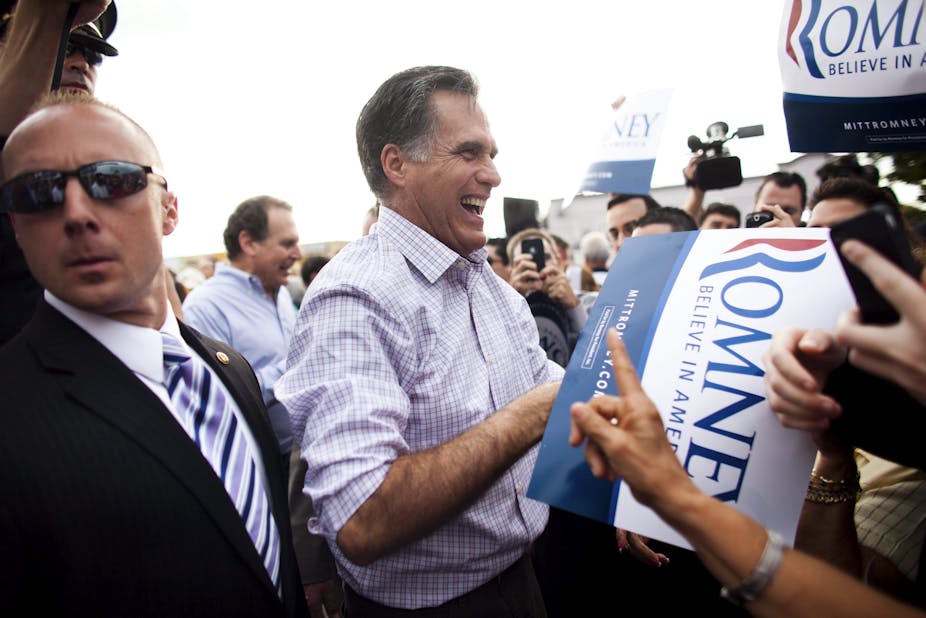Despite his solid performances in the early Republican primaries, Mitt Romney’s candidacy for the Republican nomination is still facing a crisis of legitimacy.
Social conservatives have questioned his commitment to anything, let alone the core social principles – opposition to abortion and same-sex unions – that form key aspects of their vision for what they believe is the renewal of America.
On the other hand, liberal critics of Romney have labeled him a soulless corporate manager intent on destroying the jobs of mainstream Americans, as he is accused of doing at Bain and Co when he was in charge. Republican challengers such as Newt Gingrich have echoed these criticisms as they try to wrest the momentum from Romney in the race for the nomination.
Setting the agenda
What role does the media play in questioning the bona fides of the Romney candidacy? Going back to the 1940s, social scientists have sought to ascribe to the media powerful direct effects in influencing people’s behaviour. The so-called “media effects school” saw the medium of television as capable of dramatically influencing people’s actions, and saw regulation of content as an appropriate solution.

Recently media scholars have adopted a more cautious approach in considering the media’s role in influencing behaviour. Agenda setting theory and the so-called “minimal effects school” have argued that the media is more influential in telling us what to think about, rather than what to think. In this sense, the increasing focus on Romney’s flip-flopping and his experience as a corporate firer rather than a corporate hirer would seem to be influential.
Attacks from the left
Certainly the liberal media in the United States has been having fun with Mr Romney’s peccadilloes. Noble Laureate Paul Krugman recently poured scorn on Mr Romney’s claim to have created 100,000 new jobs while at Bain in the New York Times.
Krugman pointed out Romney was counting jobs that were created at companies after Romney had actually left Bain. He also suggested Romney had not considered the jobs at competitors that had been lost after the companies Romney had helped succeeded. Finally, Krugman also questioned whether the quality of jobs lost was better than those gained as a result of the actions of Romney at Bain. The latter charge is a serious one in the current context where many Americans bemoan the manufacturing jobs being shipped offshore at a time of economic crisis.
Other liberal commentators such as Dana Milbank have likened Mr Romney to failed Presidential candidate Al Gore. Like Gore, he suggests, Romney is desperately seeking to convey an image of humanity while looking and sounding like a corporate manager.
Suspicion on the right
In dealing with the media, Romney is certainly at a competitive disadvantage, as he lacks the natural media constituency that President Obama has and former President George Bush had. In an increasingly polarised mainstream media environment in the United States dominated on the one hand by conservative media commentators like Bill O’Reilly and on the other by influential liberal organs like the New York Times and Washington Post, it is hard for Romney’s vision of America to be easily heard.

The New York Times people were initially sympathetic to Romney’s liberal conservatism whilst he was Governor of Massachusetts. His change of direction on key social and economic issues to court the increasingly conservative Republican electorate has significantly marginalised that media constituency.
On the other hand his perceived lack of authenticity and apparently magical conversion in 2005 to the anti-abortion cause has made him less able to fulfill the role of the conservative media love-child. The failure to capture this full-throated conservative media support has also made it more difficult for him to find a voice to blunt the criticisms directed against him.
Is the media really responsible?
Does that mean that the media is to blame for the focus being on Romney’s faults? As media scholar Todd Gitlin has noted, the media functions like a fun house mirror, refracting a version of reality which suits its own agenda and aims.
Although the media’s political agenda and the routine assumptions about what is news are influential the reflection still conveys a version of reality, as Gitlin’s metaphor suggests. The candidate’s own personal history and missteps as well as his apparent personal awkwardness have also been influential. In some senses, even if in a distorted way, Romney’s persona is being mirrored.
If you change your mind on crucial issues, there is inevitably a story there. If that change of heart seems designed only to win support, that magnifies the story. If you say you like firing people but also claim that you are compassionate about people’s jobs this also creates a story. If you are trying to be personable and human but only end up looking like you are trying to be personable, the media agenda can be created for you.
While the media story about Romney – one he has also helped create – will be influential in shaping his candidacy as the months unfold, this does not mean that his tilt at the presidency is doomed (that is assuming he can actually win the Republican nomination).
The American economy is still a volatile beast, one where conservative commentators have been far more successful in painting the President’s agenda and the negative role of government as responsible for the hurt Americans are feeling. If this pain rather than Romney’s missteps come to overtake the agenda the Republican still stands a chance of winning in November.

